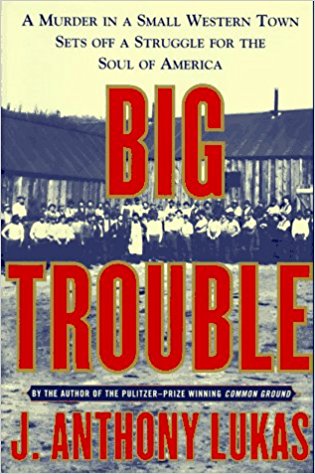Big Trouble
19/05/18 18:42
J. Anthony Lukas, Big Trouble: A Murder in a Small Western Town Sets off a Struggle for the Soul of America (New York: Simon and Schuster), 1997.

A conversation with a friend somehow drifted to a bit of the history of Idaho. Having lived there for ten years, I had a little knowledge, but he seemed to encyclopedic knowledge of the opening of the 20th Century in Idaho, knowledge that he credited to Tony Lukas' book, Big Trouble. The next time we got together, my friend loaned me his copy. It is an impressive tome! 754 pages with more than a hundred pages of footnotes and index. The size of the book, however, isn't the only thing that is impressive about it. Lucas managed to weave together a story that is riveting and to incorporate into it all kinds of details about the dynamics of American politics in the age of intense conflict between mine owners and unions. The struggle for a workable wage and reasonable working conditions led to intense violence and the deaths of far too many people. One of the victims was the former governor of Idaho, Frank Steunenberg, whose murder resulted in the arrest and trial of some of the biggest leaders of western mine unions even though the union bosses were not even in the State of Idaho when they were arrested.
Lucas goes into the details of the arrest and extradition, the personalities of the lawyers, the influence of the President of the United States and much more. He even makes a connection with baseball, theatre and more. It is a thoroughly riveting book.
Shortly after completing the book Lucas died, tragically, as the result of suicide. It has been rumored that part of his depression had to do with a sense of failure over the book. Having won the Pulitzer Prize for his book "Common Ground," he may have set impossible expectations for himself. There is absolutely nothing about this book that should have made him feel anything less than enormously accomplished. Among the tragedies of his suicide is that we will not see another similar work from his pen. And that is sad because what he did write is monumental.
